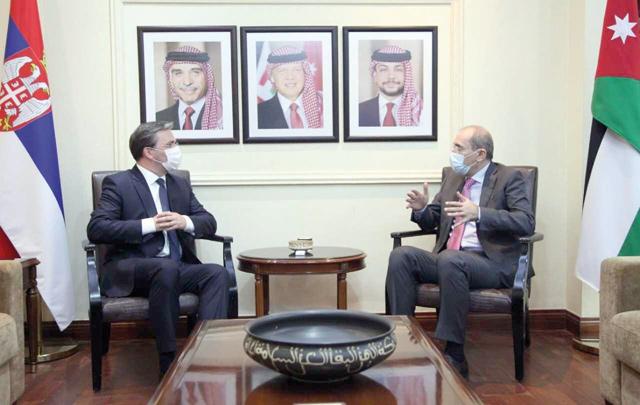- Local News
- Thu-2021-08-26 | 02:25 pm

Nayrouz News Agency :
Deputy Prime Minister and Foreign Minister Ayman Safadi and Serbian Foreign Minister Nikola Selakovic on Wednesday discussed ways to enhance bilateral relations in various fields.
The two ministers agreed to form a working group to define priorities for cooperation in the next phase in the economic, cultural, tourism and defence fields and to complete the signing of the necessary agreements to bolster cooperation, according to a Foreign Ministry statement.
Safadi and Selakovic, who arrived in Amman as part of a regional tour, affirmed the common interest in strengthening bilateral relations in a way that would reflect positively on the interests of the two countries.
They both discussed regional developments, foremost of which is the Palestinian issue and efforts aimed to find a solution that would allow a return to serious and effective negotiations to achieve a just and comprehensive peace on the basis of the two-state solution in accordance with international law.
The two ministers also reviewed the efforts made to resolve the Syrian crisis and ensure the continuation of international support for refugees as well as developments in Lebanon.
Safadi stressed the importance of maintaining calm in the occupied Palestinian territories and stopping all Israeli measures that undermine the two-state solution.
The Serbian foreign minister praised the Jordanian role and the efforts led by His Majesty King Abdullah to promote a culture of dialogue and respect for the other to achieve a just and comprehensive peace and establish security and stability in the region.
Silakovic invited the Kingdom to attend the Summit of Non-Aligned Countries, which will be held to celebrate the 60th anniversary of the first conference of the founding of the movement, which will be hosted by Serbia next October in Belgrade.
Safadi welcomed the invitation to attend the work of the Summit of Non-Aligned Countries, highlighting the positive role through which the movement contributes to achieving integration, stability and cooperation among member states as well as working to achieve balanced relations that would meet the aspirations of peoples in achieving sustainable development.
The two ministers agreed to continue consultation and coordination on common challenges, broadening the horizons of bilateral cooperation between the two countries.
The first conference of the Non-Aligned Movement was held between September 1 and 6, 1961 in Belgrade, which came six years after the founding of the movement involving 29 member states that participated in the Bandung Conference in 1955.
The Non-Aligned Movement currently has 120 member states.









